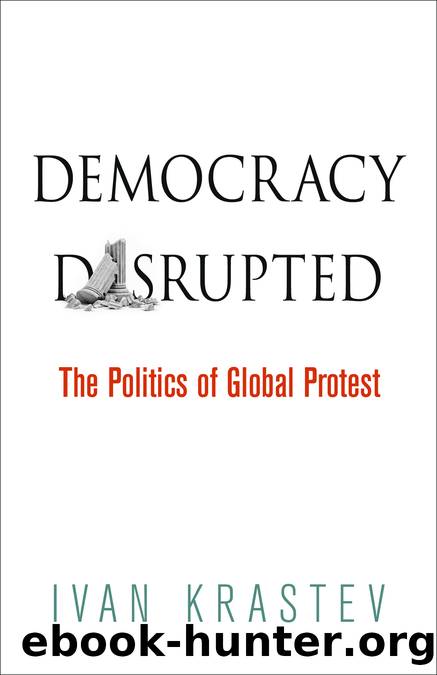Democracy Disrupted by Ivan Krastev

Author:Ivan Krastev
Language: eng
Format: epub
Publisher: University of Pennsylvania Press
Published: 2014-07-14T16:00:00+00:00
Russia
Alexei Slapovsky’s 2010 novel March on the Kremlin opens with a young poet accidentally killed by a policeman. Not knowing whom to blame and what to do, the poet’s mother picks up the body, cradles her dead son in her arms, and walks almost unconsciously toward the Kremlin. Her son’s friends and several strangers trail close behind. Alerted via social media that something is happening, other people start to arrive.
Most of them are not really sure why they came out onto the streets. They do not have a common platform, common dream, or common leader; yet they are held together by a conviction that “enough is enough” and excited by the fact that at last something is happening. The Special Forces fail to stop them. The march suddenly reaches the Kremlin. And then . . . the people go back home.8
The nonfiction version of these events unfolded in Russia in December 2011. Moscow saw its largest protests since 1993. Though it was manipulated elections, not a poet’s death, that sparked the crowd’s anger, the protesters had one important element in common with the disaffected marchers in Slapovsky’s novel: they seemed to emerge out of nowhere, taking almost everyone—including, perhaps, themselves—by surprise. The protesters were composed of an almost unimaginable crowd of liberals, nationalists, and leftists who had likely never spoken to each other and who for a few dizzying weeks dared to begin to imagine life without Putin.
Asked if the Kremlin was surprised by the unfolding of events, the senior United Russia functionary Yuri Kotler had been unambiguous: “Well, imagine if your cat came to you and started talking. First of all, it’s a cat, and it’s talking. Second, all these years, the government fed it, gave it water, petted it, and now it’s talking and demanding something. It’s a shock.”9
Like most of the other recent eruptions of protest, the Russian Spring, in the dead of winter, did indeed come as a total shock. Few observers would have predicted Moscow’s political turmoil. The Russian population has benefited economically from Putin’s decade at the helm. Although the regime is corrupt and inefficient, it is reasonable to conclude that Russians have never been freer and wealthier in their history. Russia was a classic example of Hirschman’s insight that in authoritarian regimes with open borders, the exit is a more likely choice than voice. Russia’s dissatisfied middle class during the Putin years headed out to the airport and not to oppositional rallies.
In hindsight, one might suggest that the explosion of protest in Russia was simultaneously inevitable and impossible. It was born out of a sense of hurt pride, not deteriorating standards of living. Protesters were irate at the brazen, shameless way that President Medvedev and Prime Minister Putin privately decided to swap their positions. Of course, no one assumed Putin would step aside gracefully, but the public was humiliated by the fact that he did not even pretend that their opinion mattered at all.
In this sense, Russia’s protests fit snugly with Fukuyama’s idea of a revolution of the global middle class.
Download
This site does not store any files on its server. We only index and link to content provided by other sites. Please contact the content providers to delete copyright contents if any and email us, we'll remove relevant links or contents immediately.
The Secret History by Donna Tartt(16627)
The Social Justice Warrior Handbook by Lisa De Pasquale(11489)
Thirteen Reasons Why by Jay Asher(7788)
This Is How You Lose Her by Junot Diaz(5774)
Weapons of Math Destruction by Cathy O'Neil(5037)
Zero to One by Peter Thiel(4824)
The Myth of the Strong Leader by Archie Brown(4789)
Promise Me, Dad by Joe Biden(4449)
Beartown by Fredrik Backman(4419)
Stone's Rules by Roger Stone(4416)
How Democracies Die by Steven Levitsky & Daniel Ziblatt(4399)
The Fire Next Time by James Baldwin(4343)
100 Deadly Skills by Clint Emerson(4079)
A Higher Loyalty: Truth, Lies, and Leadership by James Comey(4033)
Rise and Kill First by Ronen Bergman(4012)
The David Icke Guide to the Global Conspiracy (and how to end it) by David Icke(3883)
The Farm by Tom Rob Smith(3872)
Secrecy World by Jake Bernstein(3783)
The Doomsday Machine by Daniel Ellsberg(3731)
